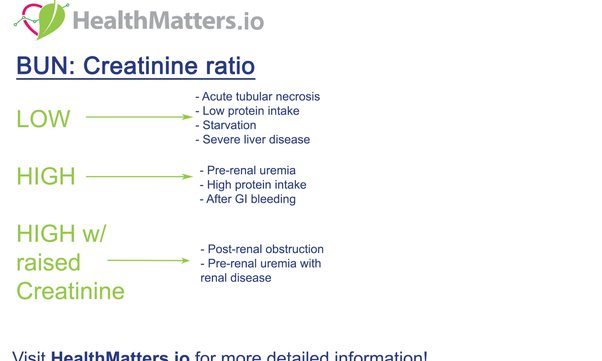Physical Address
304 North Cardinal St.
Dorchester Center, MA 02124
Physical Address
304 North Cardinal St.
Dorchester Center, MA 02124

Contents
When it comes to assessing kidney function, the blood urea nitrogen (BUN) and creatinine levels play a crucial role. These tests provide valuable insights into the health of your kidneys and can help in diagnosing various conditions. One important aspect to consider is the BUN/Creatinine ratio, which can indicate potential issues that need immediate attention.
The BUN to creatinine ratio is a measurement used to evaluate renal function and detect dehydration in the body. This ratio helps in determining if there is an imbalance that could be a sign of kidney problems or dehydration. A normal BUN to creatinine ratio typically falls between 10:1 and 20:1. A high ratio may indicate conditions that lead to reduced blood flow to the kidneys, such as congestive heart failure or dehydration.
Abnormal BUN to creatinine levels can be attributed to various underlying conditions. High BUN to creatinine levels may be caused by factors like dehydration, intestinal bleeding, hyperthyroidism, congestive heart failure, kidney diseases, or certain medications. On the other hand, low BUN to creatinine levels can result from malnutrition, advanced liver diseases, sickle cell anemia, or specific medications.
Several factors can influence the BUN to creatinine ratio. Increased dietary protein intake and alcohol consumption can elevate BUN levels, while proper hydration and maintaining a healthy weight can help reduce BUN levels. Similarly, factors like exercise, dietary habits, and medication usage can impact creatinine levels in the body.
Dehydration is a common factor that can lead to a high BUN to creatinine ratio. When the body lacks adequate fluids, the kidneys struggle to function optimally, resulting in elevated BUN levels. Increasing fluid intake is crucial in correcting this imbalance and improving kidney function. Consult with a healthcare provider for personalized hydration recommendations based on your individual needs.
Dietary choices, especially protein intake, can significantly affect BUN levels. Consuming excessive amounts of protein-rich foods can elevate BUN levels, putting strain on the kidneys. Adjusting your diet to include a balance of proteins, fruits, and vegetables can help regulate BUN levels and promote overall kidney health.
Chronic stress and intense physical activity can impact BUN and creatinine levels in the body. Managing stress through relaxation techniques, regular exercise, and adequate sleep can contribute to maintaining a healthy BUN to creatinine ratio. Engaging in moderate physical activities that do not overly strain the muscles can also support kidney function and overall well-being.
If you suspect or have been diagnosed with a high BUN to creatinine ratio, it is essential to seek guidance from a healthcare professional. Regular monitoring of kidney function through blood tests and following recommended lifestyle modifications can help in managing and improving your BUN to creatinine ratio.
Understanding the significance of a high BUN to creatinine ratio is crucial in identifying potential kidney issues and taking proactive steps to address them. By recognizing the causes and factors that influence this ratio, individuals can make informed decisions to promote kidney health and overall well-being. Consultation with healthcare providers and adherence to personalized recommendations are key in managing a dangerously high BUN to creatinine ratio.